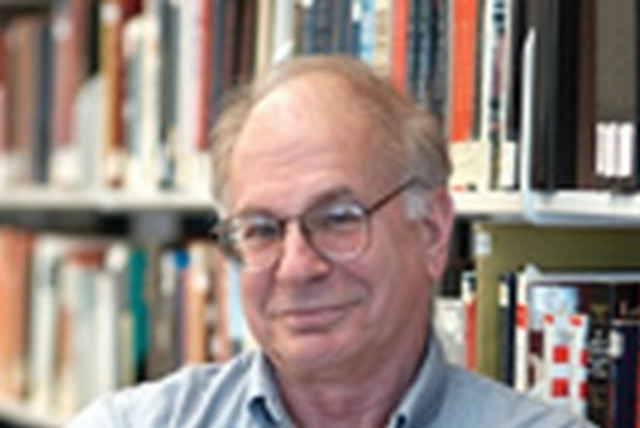Israeli-American Nobelist Daniel Kahneman, who reframed economic decision-making, dies at 90
Daniel Kahneman won the Nobel Prize in economics for “having integrated insights from psychological research into economic science.”
Daniel Kahneman, the Nobel Prize-winning Israeli psychologist who broke new ground in and found a large audience for his dissection of how humans make decisions, died Wednesday. He was 90 and had lived in New York City’s Greenwich Village for several years.
Before he started his pioneering work in the 1970s, economists tended to plug people into equations just as they would other sets of numbers. Kahneman’s work with his fellow Israeli research partner Amos Tversky (who died from cancer in 1996) on concepts such as cognitive biases and prospect theory helped change that and effectively launched the field of behavioral economics — which in turn has influenced several other fields.
His 2011 book “Thinking, Fast and Slow,” which summarized much of his research, sold over a million copies around the world. He was sought out as a guru on everything from hiring decisions to insurance risk to the justice system.
The Kahneman-Tversky partnership was explored in Michael Lewis’ 2016 book, “The Undoing Project,” which portrayed Tversky, who started out studying cognitive and mathematical psychology, and Kahneman, who was more interested in visual perception, as an academic odd couple.
Kahneman's story
Kahneman, a Tel Aviv native born to Lithuanian Jewish parents, grew up in France, where his father worked as a representative of the cosmetics firm L’Oreal. During the Nazi occupation, he and his family were frequently on the run. “It felt like being hunted. We had the mentality of rabbits,” he recalled in an interview with The Guardian. His father died from a stroke just six weeks before D-Day; after France was liberated, the family returned to Palestine.
In Israel, he served in the army starting in 1954 and became a professor of psychology at the Hebrew University in Jerusalem, where he offered the Israeli military crucial insights into how to motivate soldiers and reduce the number of mistakes made in the heat of battle.
He moved to Canada in the late 1970s and eventually settled at Princeton University in 1993, where he was the Eugene Higgins Professor of Psychology and a professor of public affairs in the Woodrow Wilson School of Public and International Affairs.
In 2002, he won the Nobel Prize in economics for “having integrated insights from psychological research into economic science.”
President Barack Obama awarded Kahneman the Presidential Medal of Freedom in 2013. A White House statement at the time referred to Kahneman as a “pioneering scholar of psychology,” who “applied cognitive psychology to economic analysis, laying the foundation for a new field of research.”
Because of, or perhaps in spite of, his own work into biases, prejudice and why people make rational decisions, he was a pessimist about the prospects for Israelis and Palestinians to make peace.
“I don’t believe in the power of rational argument in this context,” he told The Guardian, after acknowledging that he was on the far left of Israel’s political spectrum.
Kahneman is survived by his companion, Barbara Tversky (who had been married to Amos Tversky until his death); a son and daughter from his first marriage; two stepdaughters and two stepsons from his second marriage; three grandchildren, and four step-granddaughters.
Jerusalem Post Store
`; document.getElementById("linkPremium").innerHTML = cont; var divWithLink = document.getElementById("premium-link"); if (divWithLink !== null && divWithLink !== 'undefined') { divWithLink.style.border = "solid 1px #cb0f3e"; divWithLink.style.textAlign = "center"; divWithLink.style.marginBottom = "15px"; divWithLink.style.marginTop = "15px"; divWithLink.style.width = "100%"; divWithLink.style.backgroundColor = "#122952"; divWithLink.style.color = "#ffffff"; divWithLink.style.lineHeight = "1.5"; } } (function (v, i) { });

